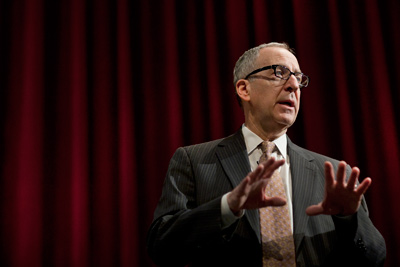Skorton stresses growth and balance in address to staff
By Nancy Doolittle

Despite the economic constraints of the past three years, Cornell is still a "very exciting place, a place that is moving forward," President David Skorton said in Bailey Hall in his annual Address to Staff Nov. 28, thanking the some 400 attending staff members for their roles in the university's continued success.
His comments were preceded by the presentation of this year's Employee Assembly Appreciation Award by Tanya Grove, chair of the Employee Assembly, to the university's business service, financial transaction and academic service centers for their work in implementing the Kuali Financial System. The annual award goes to a staff member or team "in recognition of their outstanding contributions and continuing service to the university community."
Looking to Cornell's sesquicentennial in 2015, Skorton said that the newly expanded universitywide campaign and the efforts to achieve a sustainable, balanced budget give Cornell resources to recruit new faculty, stabilize the staff workforce, continue the university's commitment to need-based financial aid and expand its role in public engagement.
"We are in the position for Cornell University to continue to be excellent and to grow in selected areas, and getting to this point has required enormous cooperation from all of you and many others who are not here today," he said.
Skorton also stressed the need to balance the increases in faculty numbers and student aid within the context of overall cost containment, and the reduced staff workforce -- resulting from layoffs, attrition and retirements -- with the work that needs to be done. One of his top priorities this coming year, Skorton said, will be to work with senior colleagues to support staff and supervisors' efforts to realign the work of their units to match up with those doing the work.
Skorton encouraged staff members to continue to offer their input, advice, reaction and guidance: "We need to work together, we need to hear each other's concerns, and we need to find ways to get to the end of each workday in a way that doesn't put your health at jeopardy," he said.
He noted that two-thirds of those who had been invited to participate in a recent employee survey have responded; these responses will provide rich data going forward, he said.
Listing the many workplace recognitions that Cornell has received, including the recent Alfred P. Sloan Award for Business Excellence in the Workplace, Skorton said, "We are recognized still as a really super place to work."
Questions from the audience ranged from proposed changes in the academic calendar (still a work in progress) to such concerns as "leveling the playing field" between colleges and units, some of which have enviable revenue streams; the status of international initiatives; and changes that Cornell Information Technologies is making to improve the performance of the Kuali Financial System implemented in July.
Media Contact
Get Cornell news delivered right to your inbox.
Subscribe